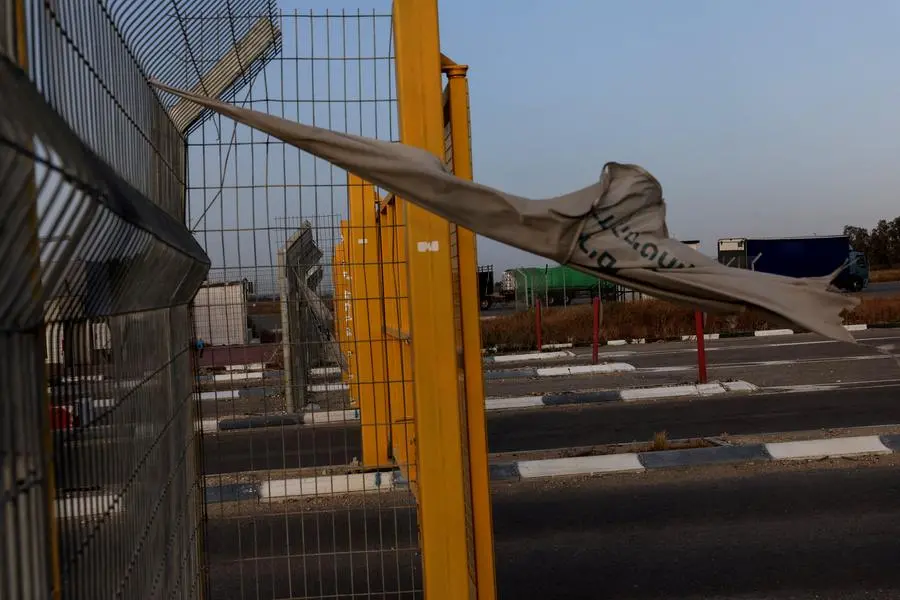PHOTO
GAZA - Aid deliveries began arriving at a U.S.-built pier off the Gaza Strip on Friday as Israel comes under growing global pressure to allow more supplies into the besieged coastal enclave, where it is at war with Palestinian militants Hamas and a famine looms.
The temporary floating pier was pre-assembled at the Israeli port of Ashdod and moved into place on Thursday on the shore of Gaza, which lacks port infrastructure of its own. No U.S. troops went ashore, the Pentagon's Central Command said.
"This is an ongoing, multinational effort to deliver additional aid to Palestinian civilians ... and will involve aid commodities donated by a number of countries and humanitarian organizations," the command said in a statement.
After months of discussions, the United Nations has agreed to assist in coordinating aid deliveries and distribution at the floating dock under the condition the operation "respects the neutrality and independence of humanitarian operations," deputy U.N. spokesperson Farhan Haq said on Friday.
The Hamas-run government media office in Gaza accused Washington of "trying to improve its ugly image" with the pier. In line with comments by the U.N., humanitarian groups and Washington itself, Hamas said the U.S. pier wasn't enough to meet the humanitarian needs and demanded greater aid shipments to the enclave by land.
"We hold the Israeli occupation and the U.S. administration fully responsible for the deliberate and premeditated policy of starvation and blockade against our unarmed Palestinian people in Gaza," Hamas said on Friday.
The U.N. reiterated that aid deliveries by land are the "most viable, effective and efficient" way to combat the humanitarian crisis in the enclave of 2.3 million people.
"Given the immense needs in Gaza, the floating dock is intended to supplement existing land crossings of aid into Gaza, including Rafah, Kerem Shalom and Erez. It is not meant to replace any crossings," Haq said.
Aid offloaded at the pier will come via a maritime corridor from Cyprus, where it is first inspected by Israel. Britain said on Friday it had delivered its first aid shipment via the pier.
Aid groups, the United Nations and Israel's closest allies, have all demanded that Israel do more to get aid into Gaza, which has been largely laid to waste by the Israeli campaign launched last year after the Hamas-led attacks on Israel on Oct.7.
The pier operation is estimated to cost $320 million and involve 1,000 U.S. troops, a U.S. defense official and a source familiar with the matter have told Reuters.
'ALMOST IMPOSSIBLE'
A new wave of upheaval has created additional need, as hundreds of thousands of people already displaced by the war and sheltering in the southern Gaza city of Rafah have evacuated to areas in central Gaza in anticipation of an Israeli assault.
The U.N. says at least 500 trucks a day of aid and commercial goods need to enter Gaza. In April, an average of 189 trucks entered a day - the highest since the war started.
Israel has said it is stepping up aid efforts and 365 trucks entered through the Kerem Shalom and Erez crossings on Thursday with flour and fuel. Hundreds of tents were also delivered for people evacuated from Rafah to the Al-Mawasi area, which Israel has declared a humanitarian zone.
Israel also recently started moving supplies through a new point close to the existing Erez crossing in northern Gaza. However, the southern crossings of Rafah and Kerem Shalom have been disrupted by military operations.
According to the Egyptian Red Crescent, 1,574 trucks were stuck in Al Arish, Egypt on Thursday waiting to enter Gaza through Rafah with critical food, the U.N. Office for the Coordination of Humanitarian Affairs said.
"Limited amounts of supplies have entered Gaza since 6 May and remain largely insufficient to address the soaring needs," OCHA said on Friday.
Since May 11, the number of trucks carrying food or flour that have entered Gaza numbered 33 via Kerem Shalom, 121 at Erez and 156 through West Erez in northern Gaza, OCHA said.
U.S. officials have said the pier would initially handle 90 trucks a day, but that number could go to 150 trucks. To maintain U.N. neutrality at the pier, U.N. staff will not have any contact with the Israeli military, which is providing security and logistics support for the operation.
Israel's military said in a statement it "will continue its efforts to allow humanitarian aid to enter the Gaza Strip by land, air, and sea, in accordance with international law."
(Reporting by Clauda Tanios, James Mackenzie, Michelle Nichols, Emma Farge and Nidal Al Mughrabi; editing by Christina Fincher, Sharon Singleton and Cynthia Osterman)





















